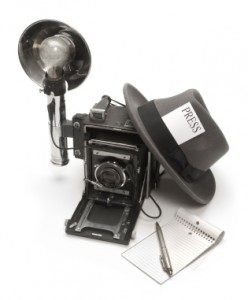
When we read, hear or watch the news, we are experiencing mediated reality. The writer picks the words, the audio engineer picks the sounds and the videographer picks the scene that paint this picture for us.
But what is the added effect of having an institution that further mediates this picture before it goes out to the public? How do media houses control the kind of content we read, hear or watch after it has been created by the original author(s)? In order to get my head around this, I asked five journalists working in the Tanzanian print industry about their experiences. I asked all of them the same five questions, and have summarized their responses below (and yes, their responses are mediated by this blog as well).
1. What topic areas do you usually pitch and write for publication?
All journalists interviewed here mentioned politics as being one of their writing interests. Outside of politics, these journalists had diverse interests, including governance, security, feminism, social media, education and culture.
2. Where have you submitted your articles in the past?
A range of daily Tanzanian newspapers have published articles by the interviewees, including Mwananchi, The Citizen, Daily News, The Guardian, Raia Mwema, Mtanzania and Mwanahalisi (when it was in print). In addition, most journalists interviewed have been published in the regional weekly journal The East African. A few interviewees had also published outside of news media, in development reports, creative writing publications, directories, in-flight magazines and blogs.
3. Did they/do they publish your article(s) as they were/are written?
Some interviewees mentioned that their work was edited before publication, but minimally. Usually, editors made slight adjustments to their pieces to either reduce their length, sharpen their leads, or make the article clearer.
However, most journalists interviewed here had seen their articles published with significant adjustment, and at times, had been completely censored.
4. If the articles were/are edited before publication, what was/is commonly retained and what was/is deleted?
For 2 out of the 5 journalists interviewed, submitted articles were rarely edited in major ways. Some editing was done on the article to improve clarity. For these journalists, having a second eye to review the article is beneficial to the overall quality.
But for the other 3 journalists interviewed, some articles have been severely edited, with one experiencing complete censorship of their “political pieces”. Another journalist mentioned that “in some parts the message isn’t as clear as I wrote and other parts I did not even write”. This latter point was corroborated by a third journalist who had seen their titles as well as the article contents being adjusted in a way that “doesn’t assure the intended message reaches as per writers’ intentions”.
5. What is your general opinion on the editorial process for public submissions to newspapers?
All interviewees agreed that the editorial process within newspaper companies is important for quality assurance. As one journalist put it, “it’s pretty awful if you don’t control your content”. Everyone agreed that editing is a necessary part of publication, given the following considerations:
(a) Mistakes are still found in Tanzanian newspapers, which would lead one to question why content is being cut out while the editor is not scrutinizing the content that is kept in. Perhaps this can be explained by working conditions: It was mentioned that journalists are often paid little and that they lack professional development opportunities from their employers.
(b) The original message or thesis should not be changed without consultation with the author. In regards to stern editing processes, one interviewee put it like this: “As long as you do not alter the message or twist words, there is nothing wrong with a vigorous editorial process”.
(c) If an article is going to be censored, it should be the responsibility of the editor to sensitize the author around the reasons for censorship. In the experience of one journalist interviewed, “articles that openly criticize and blame government of any wrong doing will be censored without negotiation. And should they somehow be published, then the publication will suffer closure immediately”.
(d) Feedback is generally welcomed by these journalists, positive and negative, whether the article is used or not. Most journalists interviewed – especially those who publish regularly – indicated their appreciation at knowing how their editors responded to their work. It was recommended that “editors of newspapers should be in much closer contact with journalists who are covering stories”.
(e) Trust between authors and their editors matters. Generally, the responses from all journalists showed that the longer a journalist had worked with a newspaper, the better their opportunities to write and be provided with honest feedback. In short, as one journalist put it, “don’t give content to anyone you don’t trust.”
A big thank you to the journalists who answered my questions!
What is your experience with mediated journalism? Do you agree that the editor’s role is just as important as the author’s? Discussion welcome below.
Further reading:

